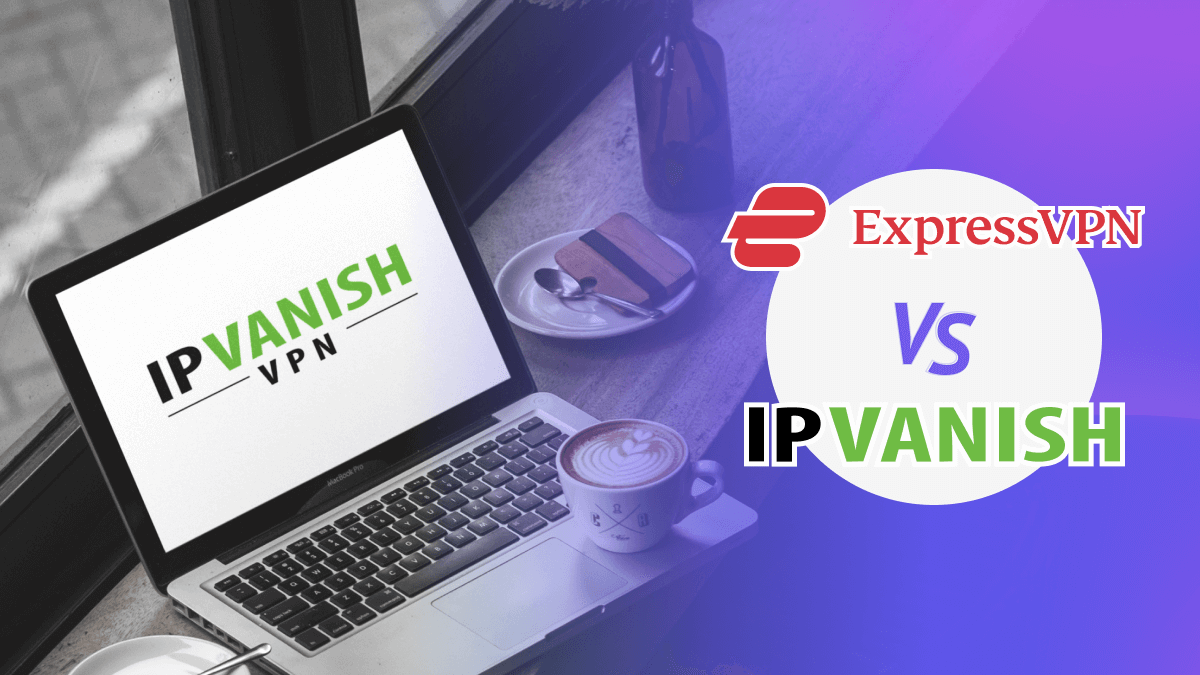
ExpressVPN vs IPVanish in 2025: VPN Services Compared
- Table of Contents
- ExpressVPN vs IPVanish: Comparison at a Glance
- My Expert Opinion: Is ExpressVPN or IPVanish Better?
- Security
- Privacy
- Key Features
- Speed
- Streaming Performance
- Server Network
- OS Support & Ease of Use
- Plans and Pricing
- Customer Support
- IPVanish vs ExpressVPN vs Competitors
- Conclusion: Why I Think ExpressVPN Wins Overall
- Methodology: How I Compared ExpressVPN and IPVanish
- Other VPN Alternatives I Like
- FAQ: ExpressVPN vs IPVanish
Quick Summary: ExpressVPN vs IPVanish
The main difference between ExpressVPN and IPVanish is that ExpressVPN is superior in terms of speed, security, streaming performance, VPN server network and distribution, and more. It comes with three price plans and a 30-day money-back guarantee.
Winner!
The best virtual private networks will protect your online traffic and unblock geo-restricted content, but not all are built equal. Both ExpressVPN and IPVanish have been around for more than a decade. That longevity means something in terms of reliability — choosing between them can be difficult. My ExpressVPN vs IPVanish review is here to help.
ExpressVPN has more than 3,000 servers in 105 countries, while IPVanish comes with more than 2,200 servers in 56 countries. You can connect a maximum of eight devices with ExpressVPN and unlimited devices with IPVanish. Both VPNs have been audited, offer IP leak protection and have flexible price plans, but that’s just the tip of the iceberg.
In this article, I compare the two VPNs across different metrics like security, privacy, streaming capabilities, speed and customer support. Make sure to read through everything before deciding on which VPN to go for.
- Money-Back Guarantee30 DaysWorldwide Server AmountOver 3,000 servers in 105 countries
- Money-Back Guarantee30 DaysWorldwide Server Amount2,400 servers in 88 locations, in 57 countries
ExpressVPN vs IPVanish: Comparison at a Glance
Before I dive into the real head-to-head comparison, here’s a quick overview of how ExpressVPN and IPVanish squared up.
| Features: | Wins | ExpressVPN | Wins | IPVanish |
|---|---|---|---|---|
| Security | ✅ | Lightway, IKEv2, OpenVPN, AES-256, ChaCha20, No leaks | ✖️ | OpenVPN, WireGuard, IKEv2, IPsec |
| Privacy | ✅ | Audited no-logs policy, RAM-only servers, No history of breach | ✖️ | Audited no-logs policy, No RAM-only servers, Handed over user logs in 2016 |
| Features | ✖️ | 8 devices, Kill switch, Split tunneling, Ad & malware blocker, Automatic obfuscation | ✅ | Unlimited device, Kill switch, Split tunneling, Ad & malware blocker, Scramble obfuscation, SOCKS5 proxy |
| Speed | ✅ | Average download speed: 35.80% unprotected | ✖️ | Average download speed: 20.66% unprotected |
| Streaming | ✅ | Netflix, Hulu, Amazon Prime Video, Max, Disney+, SmartDNS | ✖️ | Netflix, Hulu, Amazon Prime Video, Max, Disney+, No SmartDNS |
| Server Network | ✅ | Over 3,000 servers in 105 countries | ? | Over 2,200 servers in 56 countries |
| Plans & Pricing | ✖️ | $6.67/month for 15 months | ✅ | $2.19/month for 27 months |
| OS Support | ✅ | Windows, macOS, Linux, Android, iOS, Browsers, Smart TVs, Routers | ✅ | Windows, macOS, Linux, Android, iOS, Browsers, Smart TVs, Fire TV |
| Support | ✖️ | Live chat, Email, FAQs, Tutorials | ✖️ | Live chat, Email, FAQs, Phone calls |
| TOTAL WINS | 6 | 3 |
My Expert Opinion: Is ExpressVPN or IPVanish Better?
ExpressVPN is better than IPVanish. I have used it for years for gaming and streaming needs and have yet to run into any issues. Its more than 3,000 servers in 105 countries can unblock multiple geo-restricted platforms from any corner of the globe.
IPVanish has also been around for a while, and though it is cheaper than ExpressVPN, there are many areas that need improvement before it can properly compete with ExpressVPN. For instance, the user interface is clunkier than ExpressVPN’s, and its speeds are underwhelming.
However, all virtual private networks have their strengths and weaknesses. This comparison will highlight them in detail to give you a clear picture of what to expect before you commit to a subscription.
I Recommend ExpressVPN For:
- New users: ExpressVPN has an amazing user interface that’s simple and easy to navigate for first-time users.
- Streamers and gamers: ExpressVPN is fast and has reliable, stable protocols like Lightway that minimize buffering during streaming and lag while gaming.
- Privacy: ExpressVPN is one of the most audited VPN providers, is domiciled in the British Virgin Islands and has never suffered a security or privacy breach. Read our ExpressVPN review for more.
- $6.67/month for 15 months
I Recommend IPVanish For:
- Tight budgets: IPVanish has affordable price plans and supports unlimited simultaneous device connections, making it a cost-effective option for large groups of people.
- Large households: You can share the same account with multiple devices without having to purchase another subscription.
- $2.19/month for 27 months
Security
ExpressVPN and IPVanish offer encryption and kill switches for IP and DNS leak protection. Let’s break down all these features into understandable bits.
| Features: | ExpressVPN | IPVanish |
|---|---|---|
| VPN Protocols | Lightway, OpenVPN, IKEv2 | WireGuard, IKEv2, OpenVPN, IPsec |
| Encryption Types | AES-256, ChaCha20 | AES-256, ChaCha20 |
| Kill Switch | Yes | Yes |
| Private DNS | Yes | Yes |
| Ad & Malware Blocker | Threat manager, Ad blocker, Parental controls | Threat protection |
VPN Protocols
ExpressVPN has three VPN protocols. OpenVPN can switch between UDP and TCP. IKEv2, which is only available on macOS and iOS, offers fast speeds on unstable networks. Last but not least, Lightway (UDP and TCP) is the exclusive protocol that landed ExpressVPN on our best VPN for streaming list.
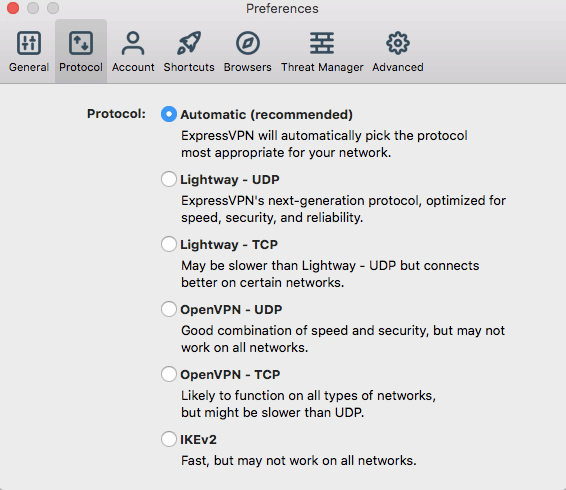
IPVanish has four protocols. OpenVPN is best for troublesome networks. IKEv2 works well on mobile apps. WireGuard has the best security and speeds. macOS, iOS and Linux users have a fourth protocol, IPsec, which isn’t the most secure but may serve if all the other options drop your internet connection.
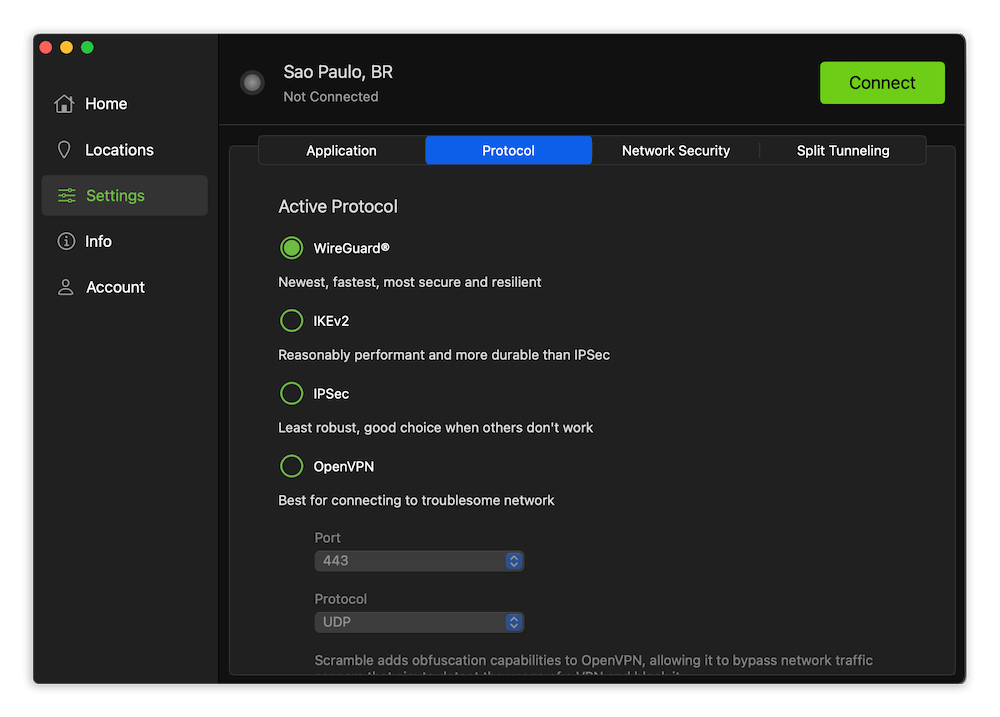
WireGuard is available on Windows, macOS, Android, iOS and Fire TV. You can use IKEv2 on Windows, macOS, Android, iOS, Apple TV and Linux. OpenVPN is available on Windows, macOS, Android, iOS, Fire TV, Linux, Chrome and routers. Finally, IPsec can only be found on macOS, iOS and Linux.
Encryption Tests
I connected to each VPN and ran the encrypted traffic through Wireshark. Below is a screenshot of the results.
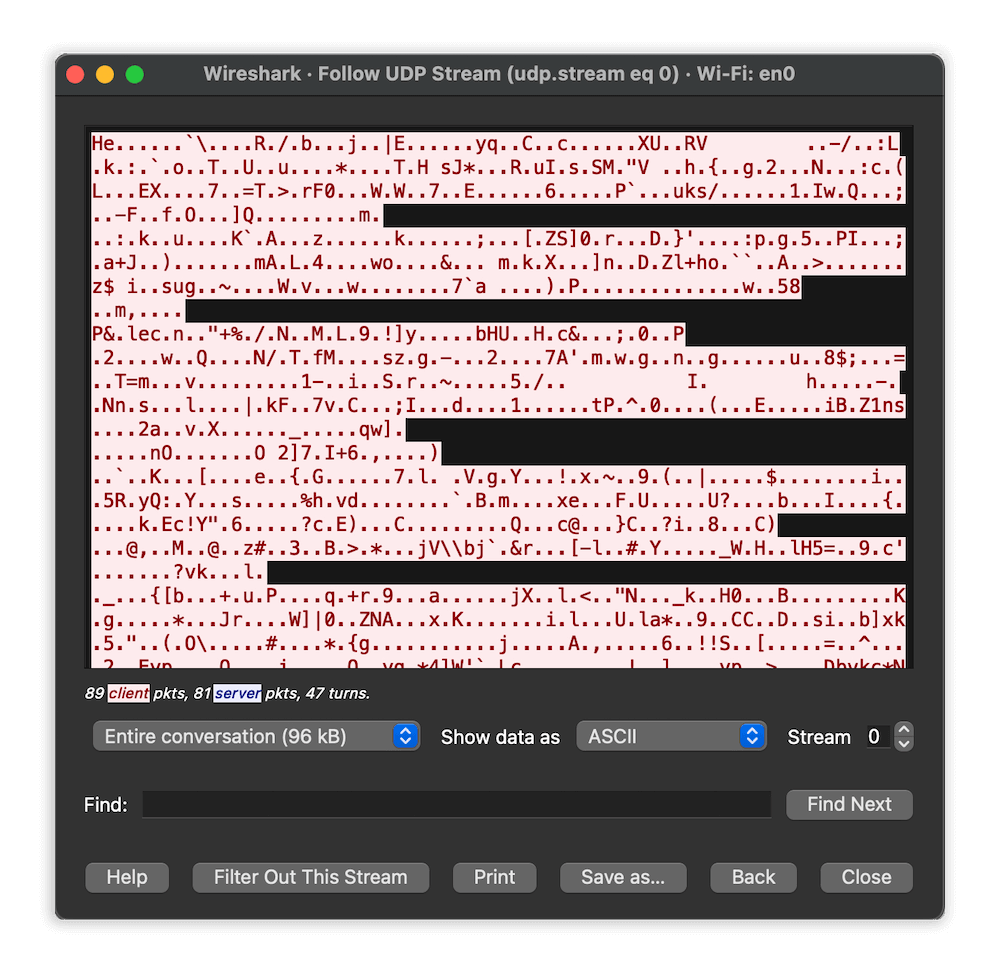
As you can see from the random, nonsensical symbols and letters in the screenshots above, both ExpressVPN’s and IPVanish’s encryption works. If my traffic were compromised, I would have seen my IP address or the name of my internet service provider (ISP) instead.
Security Breaches
Neither ExpressVPN or IPVanish have ever experienced a security breach. That’s a huge vote of confidence for both and means they’re doing everything right with their security framework.
Winner: ExpressVPN wins this category. It has been a reliable VPN for a very long time, and its leak protection is airtight. Additionally, ExpressVPN uses strong protocols and doesn’t have IPsec, which is outdated and unreliable.
Privacy
Another important role that virtual private networks serve in addition to security is granting you online privacy.
RAM Servers
Though both VPNs maintain a strict no-logs policy, ExpressVPN appears to take it more seriously than IPVanish. ExpressVPN is the only one of the two with RAM-only servers.These run on volatile memory that’s periodically wiped to ensure your data isn’t available for retrieval after you’re done browsing. IPVanish doesn’t have RAM-only servers.
No-Logs Policy
In 2016, IPVanish handed over user data logs to authorities that were investigating a child sexual abuse case involving an IPVanish user. Though I strongly condemn this vile crime, IPVanish clearly broke its own no-logs policy, which is extremely concerning.
IPVanish handed over all the data logs relating to the user’s full name, email address, username, subscription status and connection timestamps. This provided authorities with enough evidence to arrest the creep, but IPVanish was exposed.
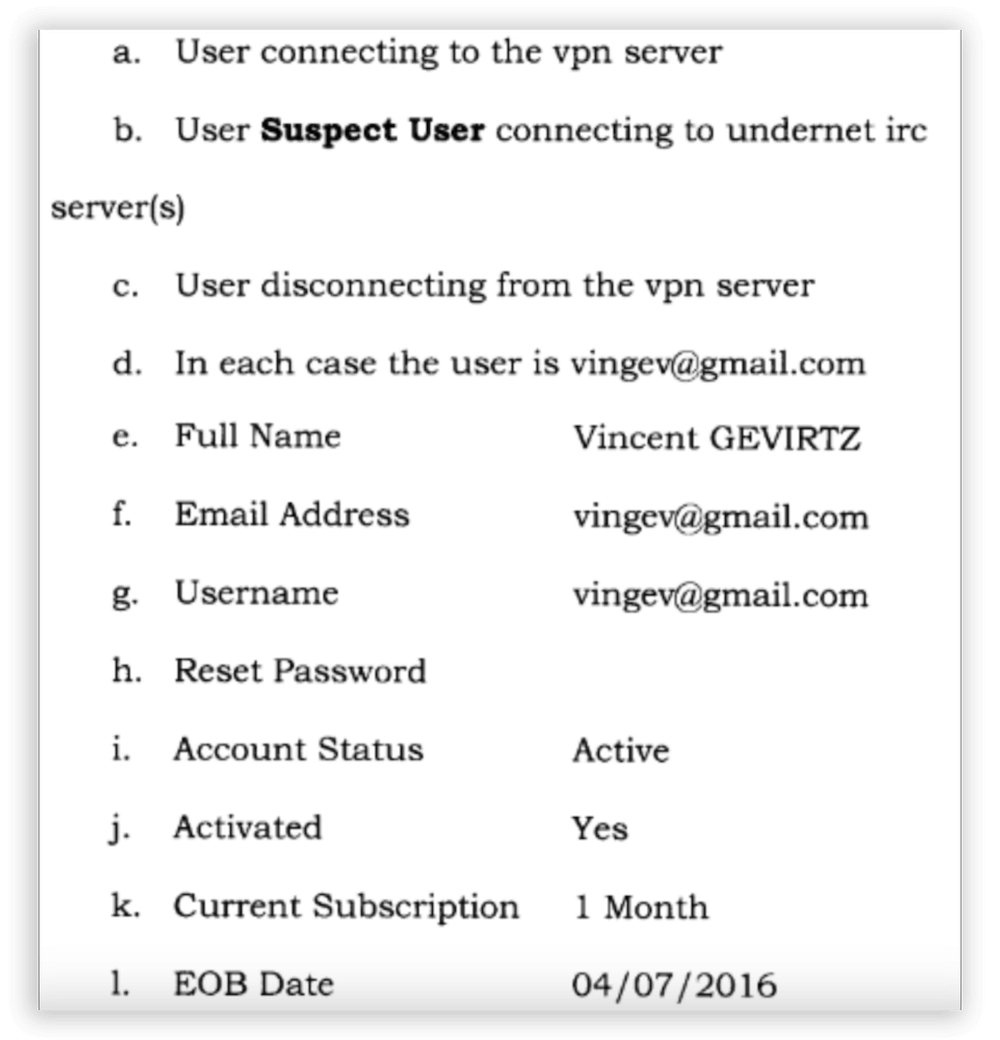
This is very different from ExpressVPN, whose Turkish servers were seized in 2017 in an assassination investigation. However, authorities found nothing. That’s because ExpressVPN actually doesn’t store any user data, just as their logging policy explicitly states.
IPVanish tried to explain themselves by claiming that a different company handed the logs over. In my opinion, this is a weak and untrustworthy response that sounds more like an attempt to distance themselves from the situation than to address why it happened in the first place.
IPVanish announced that it intends to transition its servers to RAM-only by the end of 2024. That should mean no more logging incidents, but it’ll take a few more incident-free years to fully rebuild my trust.
Independent Audits
ExpressVPN is one of the most transparent VPNs in the industry, having been independently audited 16 times to date. These audits have been carried out by Cure53, KPMG, F-Secure and PWC. Its no-logs policy and the in-house TrustedServer technology were audited in 2022 and nothing alarming was found. Below is an excerpt of the findings.
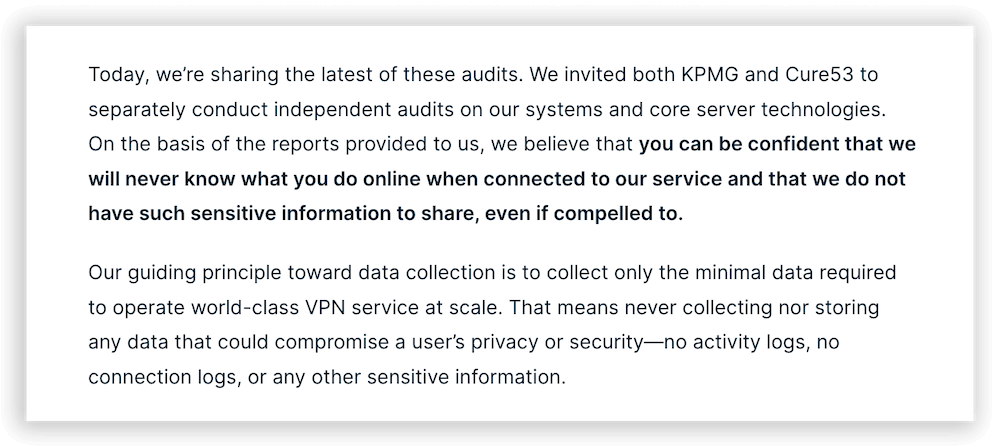
Leviathan Security Group audited IPVanish’s logging policy in 2022. The company conducted multiple traffic tests to determine whether IPVanish logged any data. Nothing suspicious was found, giving me a little more reason to believe IPVanish is serious about its policy this time around.
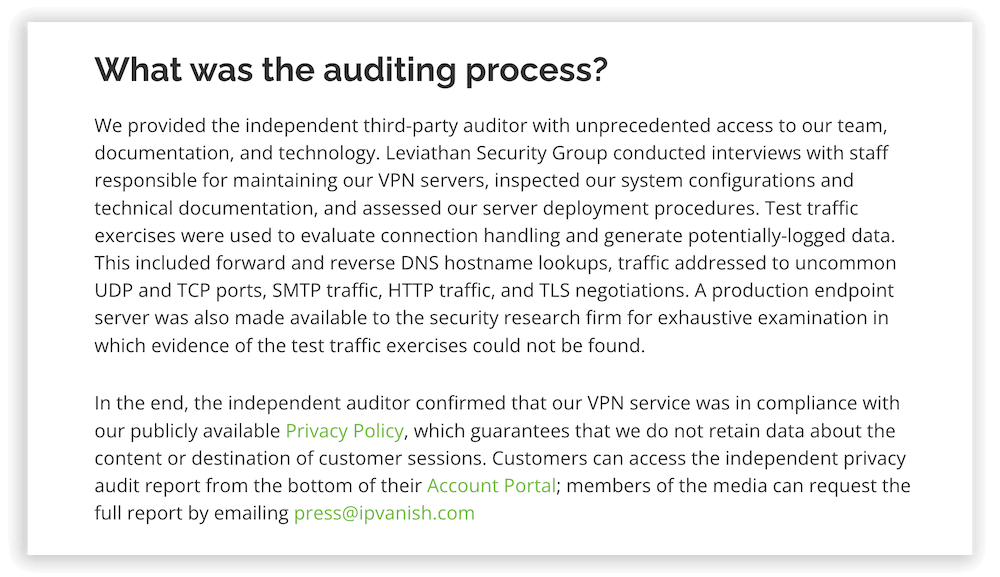
Winner: ExpressVPN wins this round, as it has undergone more audits and has never been documented violating its own no-logs policy, unlike IPVanish.
Key Features
Both VPNs have split tunneling, which enables you to include or exclude certain apps and websites from the encrypted tunnel. The biggest advantage of leaving traffic outside the tunnel is enhanced speeds. ExpressVPN has split tunneling on Windows, macOS 11 and below, and Android, while IPVanish offers it on Windows, macOS, Android and iOS.
ExpressVPN has advanced protection that offers three types of extra security. The threat manager blocks trackers and malicious sites before they create issues for you. The ad blocker deals with annoying ads, and you can make use of parental controls to block adult sites.
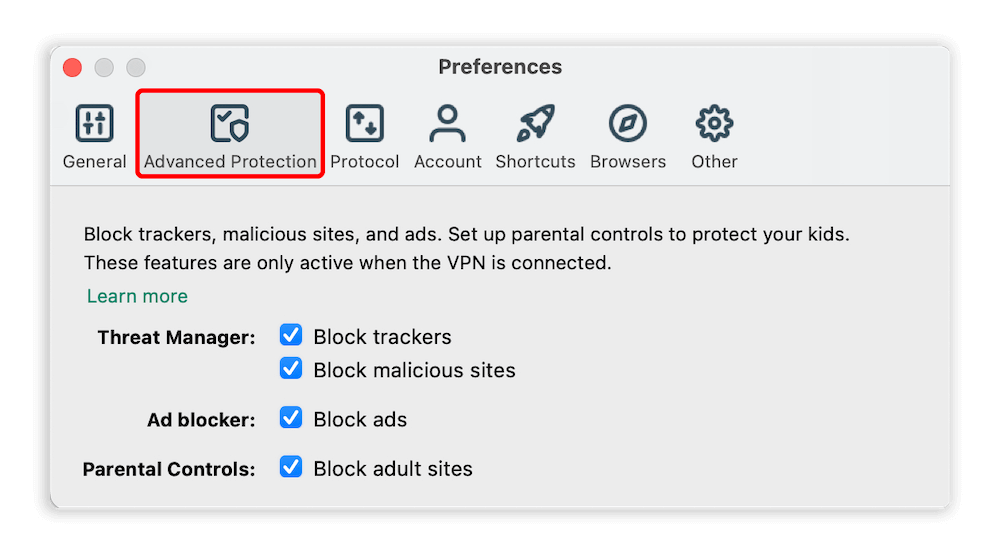
IPVanish has a blocker on all platforms called “threat protection” that protects you from malicious websites, trackers and ads. In addition, network trust lets you control how you want the VPN to work on unsecured public networks.
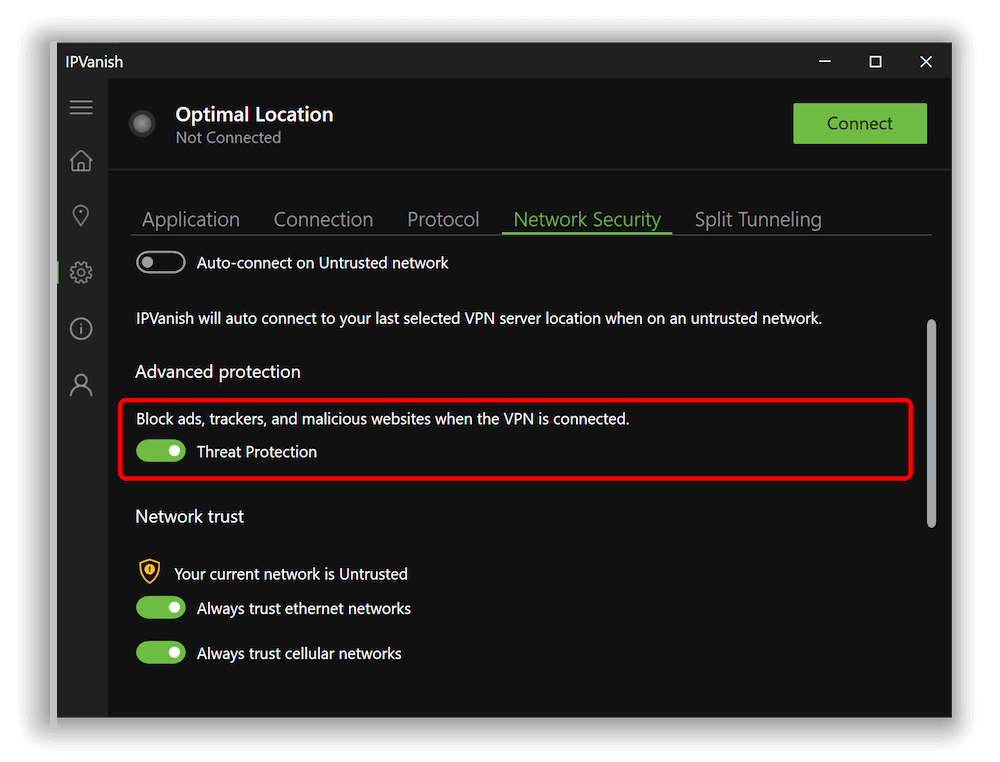
Both VPNs also come with reliable kill switches that disable your internet traffic any time your VPN connection drops. Obfuscation is another feature that helps you bypass VPN blocks on certain networks, like at school or work. It achieves this by hiding traces of VPN use from your traffic, making it look like a regular connection.
ExpressVPN automatically switches you to obfuscation when it detects VPN blocks. Obfuscation doesn’t affect your speeds, as it works with all protocols. IPVanish has an obfuscation feature called “scramble”that you need to manually activate in the app settings. However, it only works with OpenVPN, so your speeds may drop.
Of the two VPNs, only IPVanish offers the SOCKS5 proxy.A SOCKS5 server is an unencrypted proxy that masks IP addresses via an app such as a torrenting client. You can set up IPVanish’s SOCKS5 proxy with different torrent clients like Deluge, uTorrent or qBittorrent on the Windows and macOS desktop apps.
Winner: This was a tight category since both VPNs offer kill switches, obfuscation, ad blockers and split tunneling. IPVanish wins this round because its SOCKS5 proxy is good for torrenting.
Speed
A slow VPN leads to buffering during streaming and high latency while gaming. Are ExpressVPN and IPVanish fast enough to avoid these undesirable situations?
ExpressVPN Speed Tests
I tested ExpressVPN on six servers on different continents using the Lightway UDP protocol with my unprotected speeds of 50 Mbps. Check out the results in the table below.
| Location | Latency (ms) | Download (Mbps) | Upload (Mbps) |
|---|---|---|---|
| 🇰🇪 Kenya (unprotected) | 10 | 50 | 40 |
| 🇿🇦 South Africa* | 215 | 39.03 | 36.57 |
| 🇧🇷 Brazil | 353 | 36.76 | 35.11 |
| 🇬🇧 UK | 181 | 36.66 | 28.14 |
| 🇯🇵 Japan | 237 | 35.95 | 32.92 |
| 🇦🇺 Australia | 348 | 33.49 | 29.88 |
| 🇺🇸 New York | 301 | 32.95 | 25.99 |
I experienced some speed drops with ExpressVPN. The fastest server was South Africa, which also happens to be the closest one to my location — VPN performance is heavily dependent on physical distance. I was pleasantly surprised that distant places like Brazil and Australia weren’t too much slower. I didn’t experience buffering with any of these servers.
IPVanish Speed Tests
| Location: | Latency (ms) | Download (Mbps) | Upload (Mbps) |
|---|---|---|---|
| 🇰🇪 Kenya (unprotected) | 10 | 50 | 40 |
| 🇿🇦 South Africa* | 76 | 37.31 | 31.82 |
| 🇯🇵 Japan | 421 | 25.58 | 27.33 |
| 🇦🇺 Australia | 240 | 22.91 | 34.27 |
| 🇬🇧 UK | 182 | 21.02 | 34.26 |
| 🇧🇷 Brazil | 346 | 10.82 | 27.56 |
| 🇺🇸 New York | 279 | 6.41 | 38.05 |
IPVanish was slower than ExpressVPN. I had speeds of 37.31 Mbps with a South African server, which was enough for buffer-free streaming and smooth mobile and PC gaming. However, streaming was choppier on more distant servers like New York and Brazil.
Winner: ExpressVPN wins this round. It posted faster speeds than IPVanish on every server I tested.
Streaming Performance
I unblocked Netflix, Max, Hulu, BBC iPlayer, ESPN+, Amazon Prime Video, Disney+, Peacock, Paramount Plus and many more with both ExpressVPN and IPVanish. No proxy error codes popped up on my screen.
For streaming devices like LG and Samsung smart TVs that don’t support VPN apps, you’ll need a smart DNS feature. It comes with a limited set of locations and involves no encryption, so you’ll get amazing streaming speeds. On ExpressVPN, the smart DNS feature is called “MediaStreamer,” and it only unblocks U.S. content. IPVanish doesn’t offer this.
The table below shows the regular apps each VPN can unblock.
| Platform | ExpressVPN | IPVanish |
|---|---|---|
| Netflix | Yes | Yes |
| Hulu | Yes | Yes |
| Amazon Prime Video | Yes | Yes |
| Max | Yes | Yes |
| Disney+ | Yes | Yes |
| BBC iPlayer | Yes | Yes |
| Peacock TV | Yes | Yes |
| Paramount Plus | Yes | Yes |
| ESPN+ | Yes | Yes |
Winner: ExpressVPN wins this section by a small margin based on the fact that you can use the smart DNS feature to unblock streaming platforms on smart TVs that don’t support VPN apps.
Server Network
The size of the server network and its distribution determines where a VPN can unblock Netflix and other restricted content and where it’ll give you the best performance. As I mentioned, VPNs closer to you will give you better speeds. Let’s dive into the server networks that ExpressVPN and IPVanish offer.
ExpressVPN Server Spread
ExpressVPN has more than 3,000 servers in 163 locations across 105 countries. Below is a table showing the global distribution.
| Region | Countries | Locations |
|---|---|---|
| North America | 14 | 40 |
| South America | 9 | 10 |
| Europe | 47 | 65 |
| Asia | 25 | 32 |
| Africa | 6 | 6 |
| Oceania | 2 | 8 |
| Middle East | 2 | 2 |
There’s a high concentration of servers in Europe, North America and Asia but very few in Africa, Oceania and the Middle East. I’m located in Kenya, so the closest server was South Africa, which was also the fastest in my speed tests.
In short, you’ll have a much easier time unblocking content in North America, Europe and Asia compared to other regions. We even put ExpressVPN at the top of our list of the best VPNs for Japan.
IPVanish Server Spread
IPVanish has more than 2,200 servers in 84 locations across 56 countries. The table below reveals the server distribution.
| Region | Countries | Countries |
|---|---|---|
| North America | 4 | 21 |
| South America | 5 | 5 |
| Europe | 32 | 38 |
| Asia | 9 | 10 |
| Africa | 1 | 1 |
| Oceania | 2 | 6 |
| Middle East | 3 | 3 |
Like ExpressVPN, IPVanish has a higher concentration of servers in North America, Europe and Asia. However, its network distribution in Africa is dismal, with servers only in South Africa. You’ll have trouble unblocking content from the rest of Africa and most parts of the Middle East.
Winner: ExpressVPN has a bigger server network with a better distribution than IPVanish. That makes it the winner of this category.
OS Support & Ease of Use
ExpressVPN is compatible with macOS, Windows, Android, iOS, Linux, Android TV, Apple TV, Fire Stick and routers, with browser extensions for Firefox, Edge and Chrome. You can also stream U.S.-only content on a Samsung or LG TV through the smart DNS feature, called MediaStreamer. ExpressVPN supports up to eight simultaneous connections.
ExpressVPN is currently the only VPN provider in this matchup that sells a router with its service pre-installed — ExpressVPN Aircove. The router also comes with a native app you can use to operate it with ease, which is a first in the VPN industry.
IPVanish works with Windows, macOS, Android, iOS, Linux, Fire TV, Apple TV, NVIDIA Shield, Chrome and routers. Smart DNS is not available for streaming content on smart TVs without a native VPN, but you can simultaneously connect an unlimited number of devices with a single IPVanish account, making it a cost-effective option for large households.
Ease of Use
ExpressVPN groups its servers by continent, which makes locating the server you want much easier. There’s also a search button that auto-completes the name of the location as you type it. All the key features like the kill switch, protocols and ad blocker are easily accessible through the VPN app settings across all platforms.
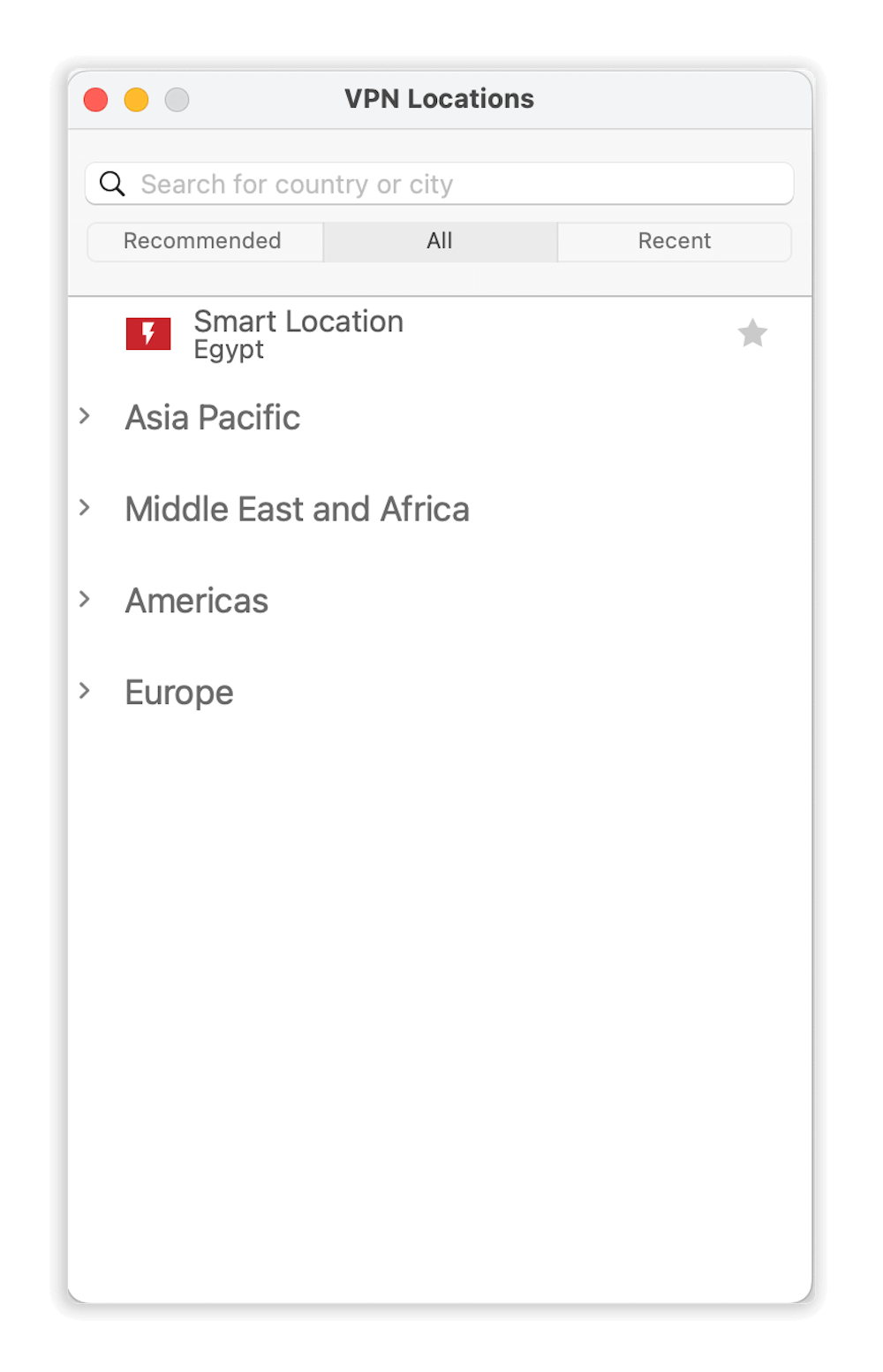
IPVanish is equally easy to navigate. The servers are listed in alphabetical order. Each comes with server load percentages that indicate how crowded a given server is. The app settings give you control over the kill switch, obfuscation, ad blocker, split tunneling and network trust. There’s even a section for keyboard shortcuts, which is helpful for advanced users.
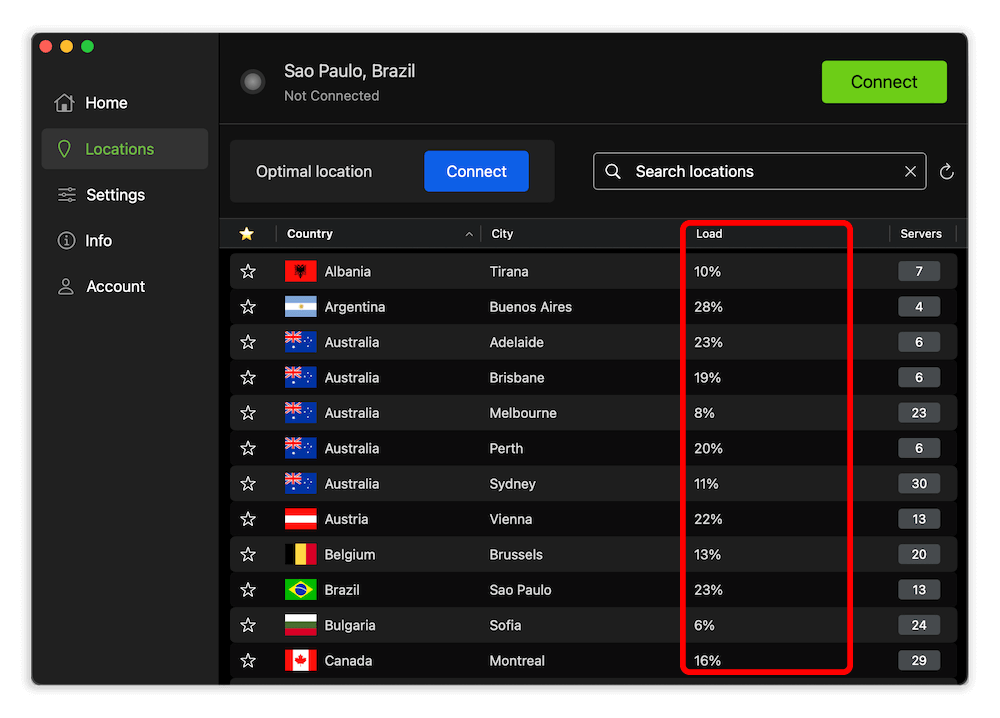
Winner: Both VPNs are compatible with a lot of platforms. However, despite IPVanish supporting unlimited simultaneous connections, ExpressVPN wins this round. It is more user-friendly and offers a unique router that comes with the ExpressVPN app preinstalled.
Plans and Pricing
Let’s break down both VPNs’ premium plans.
ExpressVPN Pricing
ExpressVPN comes with three price plans. You’ll get the best deal with the 12-month plan, which costs $6.67 per month and offers three months free the first year. The next best deal is the six-month plan, which goes for $9.99 per month. Finally, the monthly plan will set you back $12.95.
A 30-day money back guarantee covers all the plans. Additionally, ExpressVPN offers a seven-day free trial for Android and iOS.
IPVanish Pricing
IPVanish also offers three price plans, all of which are a lot cheaper than ExpressVPN. The two-year plan provides the best deal at $2.19 per month plus three months free, followed by the yearly plan, which goes for $2.79 per month plus three free months. These two plans come with a 30-day money-back guarantee.
The monthly plan costs $10.99 but doesn’t have a money-back guarantee. A seven-day free trial is available for Android and iOS devices.
Winner: IPVanish is the winner of this category. It’s cheaper and has better long-term deals.
Customer Support
Customer support is vital for VPN services. ExpressVPN and IPVanish are both sufficiently stacked with options for getting help.
ExpressVPN Customer Support
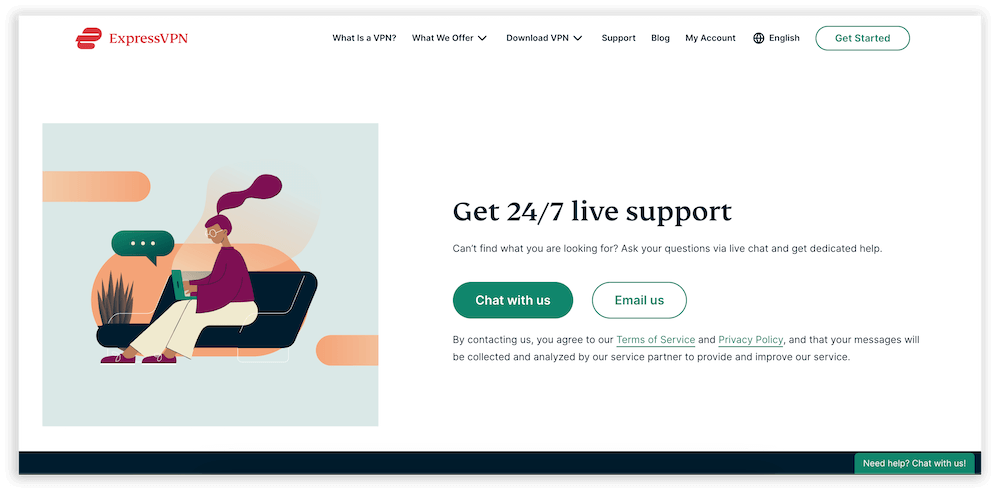
You can contact ExpressVPN customer support 24/7 via direct email or by using the live chat option on the official website. The live chat agents are fast with their responses; all you need to do to connect to one is provide your email address and state the nature of your business.
There’s also a help center with an FAQ section that provides detailed answers for common problems you may experience while using the VPN. Additionally, the help center comes with VPN tutorials on how to install ExpressVPN on different platforms.
IPVanish Support
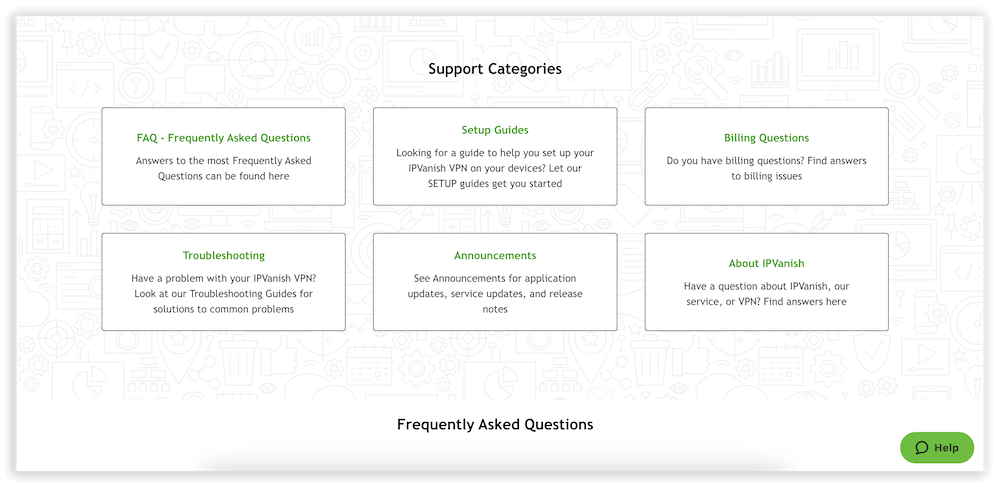
IPVanish offers 24/7 support through a live chat option that you can access on the support page. You can communicate with a bot for simple fixes or upgrade the conversation to a live agent for more complicated issues, with decently fast responses.
The chatbot connected me to a live agent immediately when I requested one. You can also contact support via direct email, but the responses weren’t as fast as through the live chat.
There’s an FAQ section, a troubleshooting section and setup guides. One area where IPVanish outshines ExpressVPN is the availability of phone support. Live chat is usually the best option in my opinion, though — you can describe your problem better and share screenshots. Plus, you can save the conversation transcript to refer to later.
Winner: IPVanish has the upper hand in this category. It has everything ExpressVPN offers, plus a direct phone line to contact customer support.
IPVanish vs ExpressVPN vs Competitors
Aside from ExpressVPN and IPVanish, there are countless other VPNs to consider. Let’s look at a couple and compare them all.
IPVanish vs ExpressVPN vs NordVPN
NordVPN is faster than both IPVanish and ExpressVPN. It also features specialty servers like double VPN, which encrypts your VPN traffic twice; obfuscated servers, which bypass VPN blocks; and Onion Over VPN, which gives you the anonymity of the Tor browser and the security of a VPN. Our ExpressVPN vs NordVPN article covers this all in more detail.
NordVPN is easy to use and has a larger server network than ExpressVPN and IPVanish, with more than 6,300 servers in 111 countries. As a final consideration, NordVPN once suffered a security breach in 2018. It quickly addressed the breach, but it left a spot on its record. NordVPN is a little cheaper than ExpressVPN but pricier than IPVanish.
ExpressVPN vs IPVanish vs Surfshark
Surfshark’s main advantage over ExpressVPN and IPVanish is its affordable long-term price plans. Like IPVanish, you can connect an unlimited number of devices simultaneously, which is perfect for large groups of users.
Surfshark has a malware and ad blocker called “CleanWeb,” an obfuscation feature called “camouflage mode” and more than 3,200 servers in 100 countries. Surfshark is also faster than both ExpressVPN and IPVanish, so you can use it for streaming, torrenting and gaming without issues.
Conclusion: Why I Think ExpressVPN Wins Overall
ExpressVPN outperformed IPVanish in six of the nine categories I checked. It protects your traffic with reliable encryption and passes security tests flawlessly. ExpressVPN has also been audited more than IPVanish, on top of having RAM-only servers and being headquartered in a country where extraditing data is very difficult.
You get better speeds with ExpressVPN thanks to the Lightway UDP protocol.Its server network is bigger than IPVanish’s, with better global distribution. The only areas where IPVanish had the upper hand are the availability of the SOCKS5 proxy and direct phone lines for contacting customer support.
Do you prefer ExpressVPN, or would you say that IPVanish is better? Is affordability more important to you than overall performance? Tell us your thoughts in the comment section below, and thank you, as always, for reading our content.
- $6.67/month for 15 monthsWinner!
Methodology: How I Compared ExpressVPN and IPVanish
Here are the key factors I considered when comparing these two VPNs.
Other VPN Alternatives I Like
- NordVPN: Fast connection speeds, Best Price: $4.13NordVPN has a large server network of RAM-only servers that are well optimized for speeds. You can use obfuscated servers and double VPN connections to boost your online security on any network. Read our NordVPN review for more details.
- Surfshark: Affordable price plans, Best Price: $2.21Surfshark is a cost-effective alternative. It has servers in 100 countries and unblocks major streaming services like Hulu, Max and BBC iPlayer. Our Surfshark review has more details.
- Proton VPN: Best free VPN, Best Price: $3.29Proton VPN stands out among free VPNs for its genuine security, servers in five locations and unlimited free data. The premium version gives you access to thousands of servers, with specialty options like Secure Core for extra privacy. Read our Proton VPN review for more details.
FAQ: ExpressVPN vs IPVanish
What Is the Difference Between ExpressVPN and IPVanish?
The main difference between ExpressVPN and IPVanish is that ExpressVPN is costlier but faster, while IPVanish allows unlimited connections.Is There a Better VPN than ExpressVPN?
It depends on the metric of comparison. CyberGhost has a bigger server network, Surfshark is cheaper and NordVPN is faster. ExpressVPN is best as an all-around high achiever.Which Is Better, IPVanish or ExpressVPN?
ExpressVPN is better than IPVanish. It’s faster and has a bigger server network, and all its servers are RAM-only, which is good for data privacy.What Is Better than IPVanish?
Surfshark is faster and more affordable, NordVPN and CyberGhost have bigger server networks, and Proton VPN offers a free version with five server locations and unlimited data. ExpressVPN handily beats IPVanish in most tests.


Leave a Reply